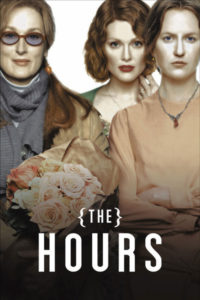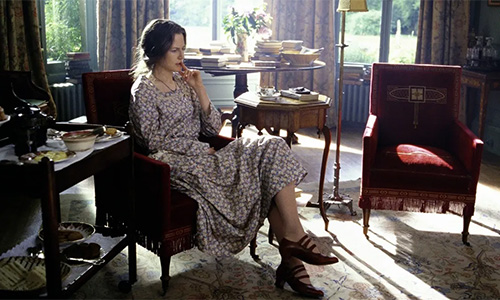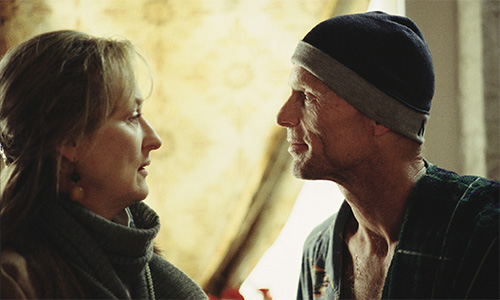 Oh, man, what a fantastic movie is. This was my second viewing of The Hours. I first watched it in 2010 and remember being extremely surprised by how much I enjoyed it. I would not have given this movie a chance back when it came out in 2002, but my interest in films has changed dramatically since then. Now, that’s not to say I still can’t enjoy a blockbuster (I watched Captain America: Civil War earlier in the same day and loved it). Still, I am much more into the human aspect of independent dramas like The Hours than I am about action movies or comedies. This movie deals with depression, a topic that I am, unfortunately, very familiar with. It does it from three different periods with three stories that are sometimes loose (and not so loosely) during others. This movie knotted Nicole Kidman (Cold Mountain, Rabbit Hole) with, surprisingly, just her third nomination to date (as of May 2016) and her first and only win. With a prosthetic nose, she was virtually unrecognizable as Virginia Woolf. But it wasn’t her physical characteristics that stood out. It was how she immersed herself in the role of a woman who you would think had it all but was so mentally troubled that she could not find any happiness in her life. An accomplished actress, this is the performance of her career in a movie that shouldn’t be missed by anybody who views life with a cup-half-empty sort of mentality.
Oh, man, what a fantastic movie is. This was my second viewing of The Hours. I first watched it in 2010 and remember being extremely surprised by how much I enjoyed it. I would not have given this movie a chance back when it came out in 2002, but my interest in films has changed dramatically since then. Now, that’s not to say I still can’t enjoy a blockbuster (I watched Captain America: Civil War earlier in the same day and loved it). Still, I am much more into the human aspect of independent dramas like The Hours than I am about action movies or comedies. This movie deals with depression, a topic that I am, unfortunately, very familiar with. It does it from three different periods with three stories that are sometimes loose (and not so loosely) during others. This movie knotted Nicole Kidman (Cold Mountain, Rabbit Hole) with, surprisingly, just her third nomination to date (as of May 2016) and her first and only win. With a prosthetic nose, she was virtually unrecognizable as Virginia Woolf. But it wasn’t her physical characteristics that stood out. It was how she immersed herself in the role of a woman who you would think had it all but was so mentally troubled that she could not find any happiness in her life. An accomplished actress, this is the performance of her career in a movie that shouldn’t be missed by anybody who views life with a cup-half-empty sort of mentality.
Told over a single day during three different periods (1923, 1951, 2001), this film centers around the inner turmoil affecting three of the finest actresses of our generation and the excellent class of supporting characters around them. With a run time of just under two hours, each story gets equal time to be told. The back and forth between the different time-frames could be confusing for some, but Stephen Daldry (The Reader, Billy Elliot) was masterful with his direction, and the editing of this film could not have been better. His work as director of this film was also recognized with an Academy Award nomination. The Hours had nine nominations, though Kidman’s Best Supporting Actress nomination was the only one that captured a win. In 1923, Sussex, a despondent Virginia Woolf, has difficulty killing off the heroine in her soon-to-be classic novel, Mrs. Dalloway. Simultaneously, a hopeless and pregnant housewife (Julianne Moore – Still Alice, The End of the Affair) is being consumed by Woolf’s novel while Clarissa (Meryl Streep – The Iron Lady, Kramer Vs. Kramer) is planning a period in 2001 for her good friend and former lover Richard (Ed Harris – Pollock, The Truman Show), a poet turned novelist who is dying of AIDS. There aren’t many happy people in this movie, and if you think you’ll leave this movie with a more positive outlook on life than you had, you might be disappointed. All three movies begin with the lead woman having breakfast. Next, all three movies involve the planning of a party. Finally, all three movies end in sadness.

Virginia Woolf’s story was my favorite of the three. When you see this movie, taking your eyes off Nicole Kidman’s face (especially her nose) is impossible. The woman you’ll see looks virtually nothing like Kidman. It mesmerized me. If you don’t know Woolf’s story, I’ll try not to spoil it here. I didn’t know it myself. Like many writers, she struggled with mental illness. At the same time, she has the adoring love of her husband Leonard (Stephen Dillane – television miniseries John Adams), who is also her publisher and protector.
Virginia and Leonard live in a quiet place with plenty of people to serve them. Before this, Virginia had spent time in London with her sister. The much busier and much more prosperous place took its toll on Virginia. She was angry, heard voices, and experienced blackouts. So, to keep her from continuing to go crazy, Leonard brought her back home. On the day that we experience this with her in The Hours, we see a calmer woman, but one who has much more going on in her head than she can manage. The look in her eyes alone tells her that she is not okay. Kidman portrays Virginia Woolf in a very successful way that in such a few minutes, we believe that she genuinely loves her husband but is utterly unhappy with her world. We learn much about what she thinks while changing the story of Mrs. Dalloway.
Richard is a man who has completely lost his way. He doesn’t leave his apartment once during this movie. The only time we see him is when he is in the presence of Clarissa. Here is a man weighing the pros and cons of his life and realizing that the cons have the advantage. He is alone and suffering and goes so far as to say that he is only alive because of her. He lives for Clarissa. Ironically, the former lovers have since sought out partners of the same sex at some point since their breakup. The movie isn’t clear on how long the pair were together or what led to their breakup. However, they have become better friends than they (probably) ever were lovers. Clarissa is currently in a less-than-ideal relationship with her partner Sally (Allison Janney – television’s The West Wing, television’s Master of Sex), while Richard is alone through his former partner, the flamboyant Louis (Jeff Daniels – The Lookout, television’s The Newsroom) is enjoying being healthy and the riches that come along with it. Though unanticipated, Louis decides to attend the party, leaving Richard alone in his stuffy apartment to feel even worse about himself.

Laura (Moore) is caught in a place where keeping up with the Jones seems to be a theme. She is married to Dan (John C. Reilly – Step Brothers, The Good Girl) and has an eight-year-old son. She is also pregnant. On this day, it is Dan’s birthday. She decides to bake him a cake and her son to help, but they fail miserably. She’s failing miserably at life, and her happiness makes her son (and the audience) feel uneasy during each of her scenes. Mrs. Dalloway seems to be her Bible, which isn’t necessarily suitable for this woman. And you can see her son suffering from the consequences of having a physically present mother but emotionally unavailable.
Philip Glass’s score is like a character in itself. It knows its importance in tying all the scenes together. It starts and stops and starts and stops until it unifies each of these stories. The music is always near, painfully piloting the story at every turn. It is quiet at times while loud and menacing at others. As the movie moves towards its conclusions, the music partners with the entire ensemble to make us experience the pain these characters experience until the end.
The way that the stories intertwine without overlapping is fantastic. When such a technique is done well, a movie succeeds immensely. And when it does not, it fails miserably. The editing here was great, and Daldry definitely had a pulse on the story. He told the story he wanted to tell and got the most out of the characters. So, even if this is one of those movies you didn’t want to like, you’ll be satisfied with the result if you give it a chance. You might not leave the film with the most optimism in your life, but you’ll leave the feeling that everyone involved in the process left everything on the table.
Plot 9.5/10
Character Development 8/10 (there was just so much to develop her that it was a little overwhelming for one film to do perfectly)
Character Chemistry 8/10 (Streep and Harris could have been better…while their acting was fine, I never felt any emotional connection between them…and in watching them, it almost felt like I was watching two actors on a stage somewhere rather than two characters in a film)
Acting 9/10
Screenplay 9.5/10
Directing 10/10 (could have been a disaster in the wrong director’s hands…in the right director’s hands, it earned nine Academy Award nominations)
Cinematography 9.5/10
Sound 10/10 (marvelous)
Hook and Reel 9/10 (this was a movie I only watched because I felt I had to…I never thought I would be able to relate to it as much as I did)
Universal Relevance 9.5/10 (themes of madness, depression, and suicide have been around forever and will continue to be around forever)
92%
A
Movies You Might Like If You Liked This Movie
- The Cider House Rules
- Rabbit Hole
- Brokeback Mountain
- The Painted Veil
- Revolutionary Road